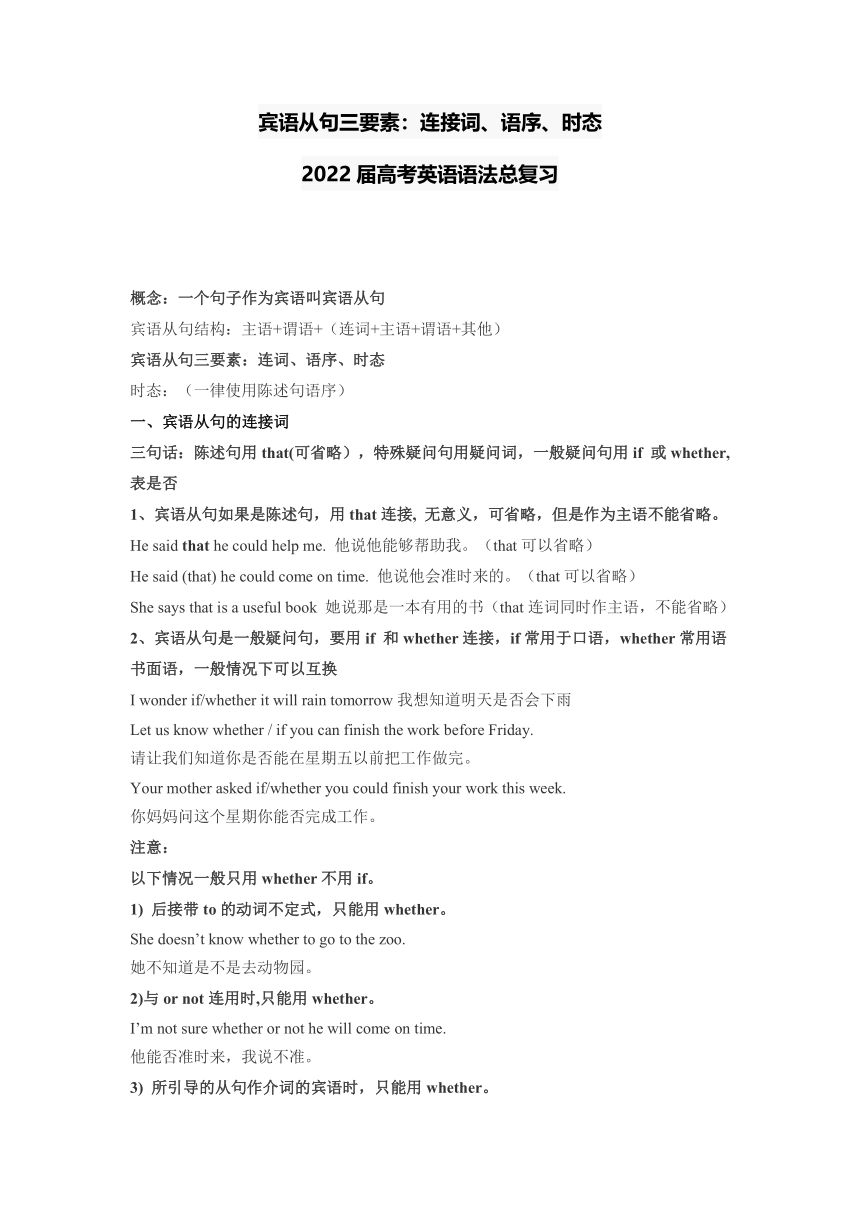2022届高考英语二轮复习:宾语从句三要素:连接词、语序、时态 学案
文档属性
| 名称 | 2022届高考英语二轮复习:宾语从句三要素:连接词、语序、时态 学案 |  | |
| 格式 | doc | ||
| 文件大小 | 31.0KB | ||
| 资源类型 | 教案 | ||
| 版本资源 | 通用版 | ||
| 科目 | 英语 | ||
| 更新时间 | 2021-11-26 10:39:09 | ||
图片预览

文档简介
宾语从句三要素:连接词、语序、时态
2022届高考英语语法总复习
概念:一个句子作为宾语叫宾语从句
宾语从句结构:主语+谓语+(连词+主语+谓语+其他)
宾语从句三要素:连词、语序、时态
时态:(一律使用陈述句语序)
一、宾语从句的连接词
三句话:陈述句用that(可省略),特殊疑问句用疑问词,一般疑问句用if 或whether,表是否
1、宾语从句如果是陈述句,用that连接, 无意义,可省略,但是作为主语不能省略。
He said that he could help me. 他说他能够帮助我。(that可以省略)
He said (that) he could come on time. 他说他会准时来的。(that可以省略)
She says that is a useful book 她说那是一本有用的书(that连词同时作主语,不能省略)
2、宾语从句是一般疑问句,要用if 和whether连接,if常用于口语,whether常用语书面语,一般情况下可以互换
I wonder if/whether it will rain tomorrow我想知道明天是否会下雨
Let us know whether / if you can finish the work before Friday.
请让我们知道你是否能在星期五以前把工作做完。
Your mother asked if/whether you could finish your work this week.
你妈妈问这个星期你能否完成工作。
注意:
以下情况一般只用whether不用if。
1) 后接带to的动词不定式,只能用whether。
She doesn’t know whether to go to the zoo.
她不知道是不是去动物园。
2)与or not连用时,只能用whether。
I’m not sure whether or not he will come on time.
他能否准时来,我说不准。
3) 所引导的从句作介词的宾语时,只能用whether。
Everything depends on whether you work hard
一切取决于你是否努力
4)当引导的宾语从句位于句首,表示强调时,只能用whether。
Whether he will succeed , I am not sure.
他是否能成功,我不确定
3、宾语从句是特殊疑问句,连词要用特殊疑问词what/ when/ where/ who等引导的宾语从句,疑问词放句首,后面是陈述句语序
此类宾语从句原来是特殊疑问句,变成宾语从句后要用陈述语序,由wh-开头的疑问词引导。包括who, whom, whose, what, which等连接代词和where, when, how, why等连接副词,这些引导词有各自的意思,在从句中要作相应的成分,不能省略。例如:
I don’t know whose the football is .(做表语)
我不知道这个足球是谁的。
Could you tell me which gate we have to go to (作定语)
请问我们得走哪个门?
He doesn't tell me what color he likes(作宾语)
他没有告诉我他喜欢什么颜色。
I wondered where he bought this cup (作状语)
我想知道他在哪里买的这个杯子
注意:特殊疑问词作主语,问句本身就是陈述句语序,变宾语从句无需调语序
Do you know what is the matter with him?你知道他怎么了吗?
Do you know what happened 你知道发生了什么事?
Do you know who is in the classroom 你知道谁在教室里
二. 宾语从句的语序
由whether/ if和特殊疑问词引导的宾语从句要用陈述语序,原来的倒装语序改成陈述语序时注意相应的助动词和动词的变化等。
Where does your father work Can you tell us →
Can you tell us where your father works
你能告诉我们你爸爸在哪里工作吗?
Did you get home very late He asked me. →
He asked me if I got home very late. 他问我是否到家很晚。
三. 宾语从句的时态
三句话:主现从随便,主过从必过,客观事实永一现
(1) 如果主句是一般现在时,宾语从句根据实际情况用各种时态。
例如:
My teacher says he will be back in a week. (一般将来时)
我的老师说他将在一个星期后回来。
My teacher says he is watching TV. (现在进行时)
我的老师说他正在看电视。
My teacher says he has seen the movie. (现在完成时)
我的老师说他已经看过这部电影了。
(2)如果主句是一般过去时,宾语从句用相应的过去时态。
My father said he was watching TV at that time.(过去进行时)
我爸爸说在那个时候他在看电视。
My father said the he had already seen the movie. (过去完成时)
我爸爸说他已经看过那部电影了。
注意:如果宾语从句是表示客观真理和规律的句子时,用一般现在时。
Our teacher told us the sun is much bigger than the earth. (一般现在时)
我们的老师告诉我们太阳比地球大多了。
四. 宾语从句的否定转移
主句如果是I think/ believe/ imagine/ suppose/ guess/ expect等,从句的否定一般要转移到主句中,其反意疑问句与从句一致。例如:
I don’t think they’ll wait to the last minute,will they?
我认为他们不会等到最后一分钟,他们会吗?
I don’t believe he did this, did he
我相信他不会做这样的事,他会吗?
2022届高考英语语法总复习
概念:一个句子作为宾语叫宾语从句
宾语从句结构:主语+谓语+(连词+主语+谓语+其他)
宾语从句三要素:连词、语序、时态
时态:(一律使用陈述句语序)
一、宾语从句的连接词
三句话:陈述句用that(可省略),特殊疑问句用疑问词,一般疑问句用if 或whether,表是否
1、宾语从句如果是陈述句,用that连接, 无意义,可省略,但是作为主语不能省略。
He said that he could help me. 他说他能够帮助我。(that可以省略)
He said (that) he could come on time. 他说他会准时来的。(that可以省略)
She says that is a useful book 她说那是一本有用的书(that连词同时作主语,不能省略)
2、宾语从句是一般疑问句,要用if 和whether连接,if常用于口语,whether常用语书面语,一般情况下可以互换
I wonder if/whether it will rain tomorrow我想知道明天是否会下雨
Let us know whether / if you can finish the work before Friday.
请让我们知道你是否能在星期五以前把工作做完。
Your mother asked if/whether you could finish your work this week.
你妈妈问这个星期你能否完成工作。
注意:
以下情况一般只用whether不用if。
1) 后接带to的动词不定式,只能用whether。
She doesn’t know whether to go to the zoo.
她不知道是不是去动物园。
2)与or not连用时,只能用whether。
I’m not sure whether or not he will come on time.
他能否准时来,我说不准。
3) 所引导的从句作介词的宾语时,只能用whether。
Everything depends on whether you work hard
一切取决于你是否努力
4)当引导的宾语从句位于句首,表示强调时,只能用whether。
Whether he will succeed , I am not sure.
他是否能成功,我不确定
3、宾语从句是特殊疑问句,连词要用特殊疑问词what/ when/ where/ who等引导的宾语从句,疑问词放句首,后面是陈述句语序
此类宾语从句原来是特殊疑问句,变成宾语从句后要用陈述语序,由wh-开头的疑问词引导。包括who, whom, whose, what, which等连接代词和where, when, how, why等连接副词,这些引导词有各自的意思,在从句中要作相应的成分,不能省略。例如:
I don’t know whose the football is .(做表语)
我不知道这个足球是谁的。
Could you tell me which gate we have to go to (作定语)
请问我们得走哪个门?
He doesn't tell me what color he likes(作宾语)
他没有告诉我他喜欢什么颜色。
I wondered where he bought this cup (作状语)
我想知道他在哪里买的这个杯子
注意:特殊疑问词作主语,问句本身就是陈述句语序,变宾语从句无需调语序
Do you know what is the matter with him?你知道他怎么了吗?
Do you know what happened 你知道发生了什么事?
Do you know who is in the classroom 你知道谁在教室里
二. 宾语从句的语序
由whether/ if和特殊疑问词引导的宾语从句要用陈述语序,原来的倒装语序改成陈述语序时注意相应的助动词和动词的变化等。
Where does your father work Can you tell us →
Can you tell us where your father works
你能告诉我们你爸爸在哪里工作吗?
Did you get home very late He asked me. →
He asked me if I got home very late. 他问我是否到家很晚。
三. 宾语从句的时态
三句话:主现从随便,主过从必过,客观事实永一现
(1) 如果主句是一般现在时,宾语从句根据实际情况用各种时态。
例如:
My teacher says he will be back in a week. (一般将来时)
我的老师说他将在一个星期后回来。
My teacher says he is watching TV. (现在进行时)
我的老师说他正在看电视。
My teacher says he has seen the movie. (现在完成时)
我的老师说他已经看过这部电影了。
(2)如果主句是一般过去时,宾语从句用相应的过去时态。
My father said he was watching TV at that time.(过去进行时)
我爸爸说在那个时候他在看电视。
My father said the he had already seen the movie. (过去完成时)
我爸爸说他已经看过那部电影了。
注意:如果宾语从句是表示客观真理和规律的句子时,用一般现在时。
Our teacher told us the sun is much bigger than the earth. (一般现在时)
我们的老师告诉我们太阳比地球大多了。
四. 宾语从句的否定转移
主句如果是I think/ believe/ imagine/ suppose/ guess/ expect等,从句的否定一般要转移到主句中,其反意疑问句与从句一致。例如:
I don’t think they’ll wait to the last minute,will they?
我认为他们不会等到最后一分钟,他们会吗?
I don’t believe he did this, did he
我相信他不会做这样的事,他会吗?
